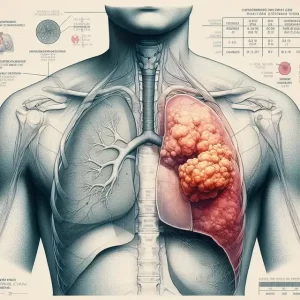The Next-Generation Broad-Spectrum Cancer Drug: RLY-4008
- FDA Approved Opdualag: The First Immunotherapy Targeting LAG-3
- Cutaneous Reactions Following COVID-19 Vaccination: A Review of the Evidence
- Brief Intermittent Exercise Reduces Heart Disease and Death Risk
- Personalized Lung Tumor Chips Assess PD-1 Therapy Response
- Study Shows Prior Infection Offers Strong Immunity to Original COVID-19 Strain
- Chinese Food Products Dominate Korean Tables Amid Safety Concerns
The Next-Generation Broad-Spectrum Cancer Drug: RLY-4008
- AstraZeneca Admits for the First Time that its COVID Vaccine Has Blood Clot Side Effects
- Was COVID virus leaked from the Chinese WIV lab?
- HIV Cure Research: New Study Links Viral DNA Levels to Spontaneous Control
- FDA has mandated a top-level black box warning for all marketed CAR-T therapies
- Can people with high blood pressure eat peanuts?
- What is the difference between dopamine and dobutamine?
- How long can the patient live after heart stent surgery?
The Next-Generation Broad-Spectrum Cancer Drug: RLY-4008, Shows Promising Data in Combatting Multiple Solid Tumor Cancers!
Summary:
Recently, a report from the 2023 AACR-NCI-EORTC Molecular Targeted and Cancer Treatment International Conference revealed that the new generation FGFR2 inhibitor, RLY-4008, demonstrated excellent efficacy in various solid tumor patients with FGFR2 gene mutations, including hormone receptor-positive and HER2-negative breast cancer patients.
-
Recent clinical research has demonstrated that the next-generation FGFR2 inhibitor, RLY-4008, exhibits remarkable clinical activity across a range of solid tumor cancers, both in terms of tumor shrinkage rates and disease control.
-
The drug displays significant therapeutic efficacy for patients who have never received FGFR inhibitors before, even in the case of cancers that were traditionally challenging to treat, such as cholangiocarcinoma.
-
While the drug does come with some notable side effects, its overall safety profile is manageable. Some patients may need to pause treatment, reduce dosages, or discontinue it, but a substantial portion of patients can continue to receive treatment.

Research Details:
Recently, a report from the phase 1/2 ReFocus trial (NCT04526106) at the 2023 AACR-NCI-EORTC Molecular Targeted and Cancer Treatment International Conference revealed the favorable clinical activity of the new FGFR2 inhibitor, Lirafugratinib (RLY-4008), in solid tumor patients with FGFR2 gene mutations, including hormone receptor-positive and HER2-negative breast cancer patients.
Specifically, for patients carrying FGFR2 fusions/rearrangements (n = 26), the drug led to a significant tumor reduction or disappearance in 35% of cases, with a disease control rate of 69% when stable disease cases are included.
For patients with FGFR2 amplifications (n = 34), the drug resulted in a substantial tumor reduction or disappearance in 24% of cases, with a disease control rate of 62% when including stable disease cases. For patients with FGFR2 mutations (n = 24), these figures were 13% and 42%, respectively.
Furthermore, the drug exhibited enduring efficacy in these FGFR2-altered solid tumors. Among 17 patients, 58.8% experienced a continuous effective response for at least 6 months.
Overall, in all tumor types (n = 60), RLY-4008 led to significant tumor reduction or disappearance in 28% of patients and controlled the disease (either stabilizing or shrinking) in 65% of patients.
The drug’s broad-spectrum effectiveness was further validated, showing treatment responses in eight different tumor types, including gastric cancer, breast cancer, pancreatic cancer, non-small cell lung cancer, ovarian cancer, colorectal cancer, and more, with tumor shrinkage or disappearance rates ranging from 9% to 67% and disease control rates ranging from 45% to 100%.
In heavily treated hormone receptor-positive, HER2-negative breast cancer patients, the drug achieved a significant tumor reduction in 40% of patients, with tumor control seen in 70% of patients. Notably, 70% of these patients also carried ESR1 mutations.
The response duration for this breast cancer group varied from 5.6 to 12.8 months, with a minimum disease control duration of 6 months.
Dr. Don Bergstrom, Chief Development Officer at Relay Therapeutics, stated in a press release, “As previously reported, the research data provides important early evidence that RLY-4008 has the potential to help patients with FGFR2 fusion cholangiocarcinoma and other types of FGFR2-altered tumors.”
Although FGFR2 mutations drive multiple cancer types, there are currently no approved selective FGFR2-targeted drugs. Dr. Alison M. Schram, a medical oncologist at Memorial Sloan Kettering Cancer Center and an official partner of Sino Medical, emphasized this point in the data report.
Currently, only two solid tumors have approved some pan-FGFR inhibitors for treatment: Pemigatinib (Pemazyre) and Futibatinib (Lytgobi) for cholangiocarcinoma and Erdafitinib (Balversa) for urothelial carcinoma.
In contrast to these medications, RLY-4008 represents an effective and highly selective novel FGFR2 inhibitor. Dr. Schram added that this drug had previously demonstrated potent anti-cancer activity in various types of FGFR2-altered tumors.
Furthermore, Dr. Schram noted that the drug showed distinctive early efficacy in FGFR2 fusion or rearrangement cholangiocarcinoma patients. In patients who had not received FGFR inhibitor treatment before (n = 38), the average rate of tumor reduction or disappearance for all tested doses reached 57.9%.
In a phase 2 clinical trial stage, 17 cholangiocarcinoma patients who had not received FGFR inhibitor treatment before, after receiving the recommended phase 2 dose of RLY-4008, experienced a remarkable tumor reduction or disappearance in as many as 82.4% of cases.
Within the population of effective non-cholangiocarcinoma solid tumor patients (n = 84), half of them received systemic treatment three times or more. The majority of these patients had gastric cancer (31%), followed by other tumor types (18%), breast cancer (17%), pancreatic cancer (8%), ovarian cancer (6%), colorectal cancer (5%), non-small cell lung cancer (5%), endometrial cancer (5%), cancer of unknown primary site (4%), and salivary gland cancer (2%).
Reportedly, RLY-4008 has manageable toxic side effects. At least 15% of patients experienced treatment-related adverse events (TRAEs), including nail toxicity, palmar-plantar erythrodysesthesia, dry mouth, dry skin, hair loss, fatigue, retinal pigment epithelial detachment, dry eyes, taste disturbances, and hyperphosphatemia.
Moreover, 47.6% of patients had to discontinue drug treatment due to side effects, 35.5% needed dose reduction, and 0.8% terminated treatment. As of the data cutoff date on August 23, 2023, 30.6% of patients were still receiving the drug treatment.
Reference Source: Read More
The Next-Generation Broad-Spectrum Cancer Drug: RLY-4008, Shows Promising Data in Combatting Multiple Solid Tumor Cancers!
(source:internet, reference only)
Disclaimer of medicaltrend.org
Important Note: The information provided is for informational purposes only and should not be considered as medical advice.



